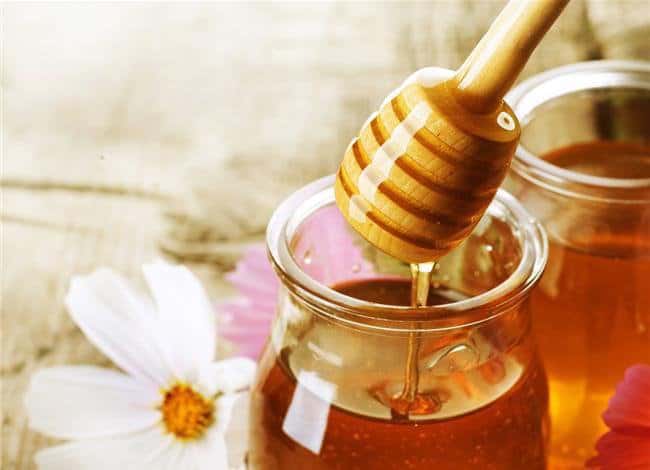
Honey has been considered an antidote by many cultures for thousands of years. While honey may have some health benefits, it is still considered a source of added sugar. Many global health organizations recommend limiting intake of added sweeteners, as a typical Western diet is high in added sugar.
Using honey in place of other sweeteners could provide a source of antioxidants and other health benefits compared to regular table sugar, but it does not mean honey should be ingesting ad libitum.
Here are some potential health benefits of honey and how to pick the type of honey that is best for you.
Antibacterial
Honey contains a specific type of protein, defensin-1, that may be responsible for fighting off bacteria according to a 2010 research study. Honey also has low water availability and a low pH which also inhibit bacteria growth. Placing honey on wounds has been done for centuries to lower risk of infection. Applying raw honey to wounds may even help speed recovery according to some research.
Even though honey has antimicrobial properties, honey may not be a suitable replacement for antibiotics. A 2013 study suggested that using honey in place of antibiotics showed no significant difference in research subjects for the time to their first infection. Before using honey for treatment or prevention for sickness, consult a medical professional.
Antioxidants
Honey is rich in specific antioxidants called flavonoids. Antioxidants from food can help offer protection to body cells caused by free radicals. Damage from free radicals can increase risk for cardiovascular disease, some types of cancer and other chronic diseases.
A 2011 review of the health benefits of honey suggests that the antioxidants in honey may offer specific protection against cardiovascular disease. Honey may lower risk of cardiovascular disease by protecting low density lipoprotein (LDL) cholesterol from getting oxidized and helping blood vessels to dilate which can help lower blood pressure.
Digestion health
Treating digestion issues with honey has been done for centuries. Specifically, raw honey may be helpful with treating acid reflux. Honey may also help lower the specific bacteria associated with peptic ulcers, H. pylori.
Honey is composed of mostly carbohydrates and contains a specific type of carbohydrate called oligosaccharides. These oligosaccharides from honey act as a prebiotic, which are food for beneficial bacteria in the colon. Ingesting sufficient amount of prebiotics can promote the growth of probiotic bacteria, which can have numerous positive health effects.
Keep in mind honey is also primarily composed of the monosaccharide fructose. Ingesting high levels of fructose may have a laxative effect.
Treating allergies
Eating local, raw honey may be advantageous in lowering symptoms of seasonal allergies. Some research even indicates that honey may help cough symptoms better than conventional cough medicine.
Pollen is a common trigger for allergies, and consuming honey with a tiny amount of pollen from the bees can help desensitize an allergy response in the body. Raw honey would contain traces of pollen while heat treated honey would not.
Keep in mind, some health authorities warn that ingesting raw honey for allergy treatment or prevention can be risky, as there is no way to tell how much pollen will be in raw honey. Eating raw honey does have the risk of triggering an allergic reaction if pollen levels are high. Speak with a health professional before trying to use raw honey for allergy treatment.
Possible risks from consuming Honey
Raw honey especially may have certain health benefits as listed above. However, raw honey, because it is not pasteurized, may be a potential source of food borne illness. People who are immune compromised may not benefit from ingesting raw honey or other food sources of potential food borne illness. Pasteurized honey has been heat treated and may be considered less likely risk for food borne illness.
It is not recommended to give raw honey to infants under 12 months because they are at risk for contracting potentially life threatening botulism. Also note that honey sold in grocery stores may not be pure honey. Sometimes honey is mixed with high fructose corn syrup or other sweeteners. For the highest amount of nutrient value, purchase honey from a reputable source that uses 100% real honey.
If you have blood sugar issues or are at risk for diabetes, talk with a health professional before adding honey to your diet.
Conclusion
Honey has been used for centuries in various cultures as a means of treatment for many conditions. Some recent research suggests raw honey may have a positive effect on some digestive disorders, lowering risk for seasonal allergies and a source of antioxidants in the diet. However, more research needs to be done to understand fully the impact of raw honey in the body and how varying types of honey may differ.
In general, honey should be safe to eat. However, people who are immune compromised or at risk for diabetes should consult a health professional before adding honey to the diet.
References used in this article










